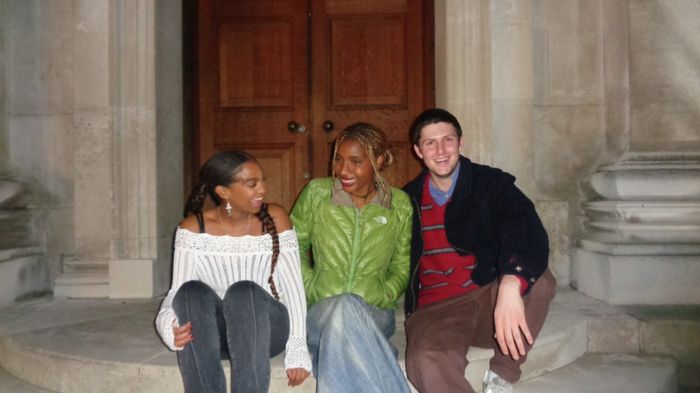Behind the scenes at Cambridge World Cinema Society
Nikolas Boyd-Carpenter talks to the minds behind one of the the university’s fastest-growing societies

Cambridge is overrun with societies. The 2024 prospectus claims the University hosts over 700 of them, and I’m sure I’m not the only one who can recall the excitement of Freshers’ Fair giving way to the realisation that there I would never have enough time to take up caving or join a jazz orchestra. Cambridge World Cinema Society (CWCS) is, however, a group to keep an eye on. Founded only a few years ago, it has picked up devotees rapidly, and is fast becoming one of the most popular film societies among the student body.
Its formula is simple: each week, on a Wednesday or Thursday evening, the society screens a film on a big screen (usually in Fitzwilliam College, though Christ’s often plays host too), charging a minimal price to show unusual movies, sometimes with an introduction from the society or, on occasion, from an academic. The one rule? The main language of the chosen film must be something other than English. The result is a consistently varied and insightful selection of international cinema.
“Fast becoming one of the most popular film societies among the student body”
Meeting committee members Fergus Selsdon-Games and Aristide Chryssoulis, I’m struck by just how passionate they are about the role of the society in Cambridge. “It’s all about the audience,” Fergus tells me – the society aims to “get people together and talking,” and certainly takes into account an “educational element” to their work. Fergus identifies an interesting paradox: “the contemporary scene is totally depreciated for young filmmakers in the UK,” but at the same time, “totally new tools have become available for watching other films. Much of the stuff in cinemas today is either prestige dramas or blockbuster movies, and so there’s a gap that needs to be filled.” CWCS, therefore, is using the opportunities afforded by new streaming services and digital restoration techniques to expose young people to a series of exhilaratingly different films.

I myself have enjoyed a number of trips to CWCS screenings, but nothing compares to my first visit, where I watched Funeral Parade of Roses, a stunning and surreal Japanese retelling of the myth of Oedipus. I remember a certain sense of wonder, of realising possibilities in cinema I had never been aware of before. As such, I’m eager to ask for more recommendations – Fergus highlights the directors Tsai Ming-liang (a dream guest for the society) and Radu Jude. A fellow Greek, I’m glad to hear Aristide celebrate the works of Yorgos Lanthimos and Theodoros Angelopoulos, though so far the society has held off from screening the latter’s films, concerned about how audiences will react to their long running times and slow pace. “There’s always a bit of give and take,” says Fergus. “We’ve tried to puncture the toxic film bro stereotype. If a film is boring we’re prepared to admit it!”
The society’s committee works by consensus to select films, always aiming for a variety of genres and nations, and rarely selecting particularly well-known works. Rather than release a termcard, they choose to announce each film on a weekly basis, taking real care over their choices; as Fergus puts it, “we don’t want to feel hemmed in.” This can be a double-edged sword, of course – Aristide quips that he spends “way too much time” on it, while Fergus tells me that he takes it “very personally”, paying close attention to the audience’s response. “If they cry, you’re winning,” he jokes.
“CWCS attempts to act as an antidote to such narrow-mindedness”
The society’s holy grail is “a permanent home”, an aspiration not helped by colleges becoming less amenable to hosting screenings as the group has grown. Fergus laughs about “the market forces that crush cultural expression time and again,” but there is a serious point to be raised: why won’t colleges support a society that encapsulates Cambridge at its best – open, international, curious and culturally engaged? The Anglophone world often suffers from a frustrating parochialism when it comes to international media. In a nation that has cast itself off from Europe, with one of the lowest rates of multilingualism across the continent, Byron’s “tight little island” lives up to its name, insulating itself from other cultures. CWCS attempts to act as an antidote to such narrow-mindedness. Both in exposing its general audience to other cultures and allowing international students an opportunity to celebrate their own identities, it is fomenting greater interest in world cinema in Cambridge and, most important of all, bringing people together. Aristide wants to end by thanking the society’s audiences: “It would be nothing if people didn’t show up. We’re very grateful”.
For more information, follow @camworldcinema on Instagram.
 News / Uni to ‘review’ tripos rankings and weekend lectures in undergrad teaching overhaul10 April 2025
News / Uni to ‘review’ tripos rankings and weekend lectures in undergrad teaching overhaul10 April 2025 News / Rowing row continues as Oxford and Cambridge scrap women’s trial race9 April 2025
News / Rowing row continues as Oxford and Cambridge scrap women’s trial race9 April 2025 News / PETA urges Cambridge dictionary to change ‘derogatory’ rat definition11 April 2025
News / PETA urges Cambridge dictionary to change ‘derogatory’ rat definition11 April 2025 Science / Dark energy: lights out for the universe?10 April 2025
Science / Dark energy: lights out for the universe?10 April 2025 Arts / Cambridge: a style guide?11 April 2025
Arts / Cambridge: a style guide?11 April 2025





